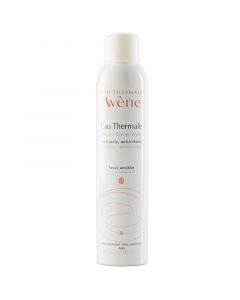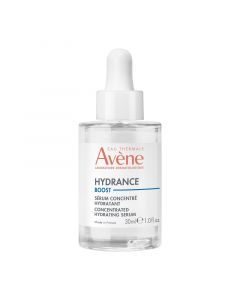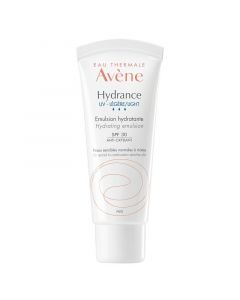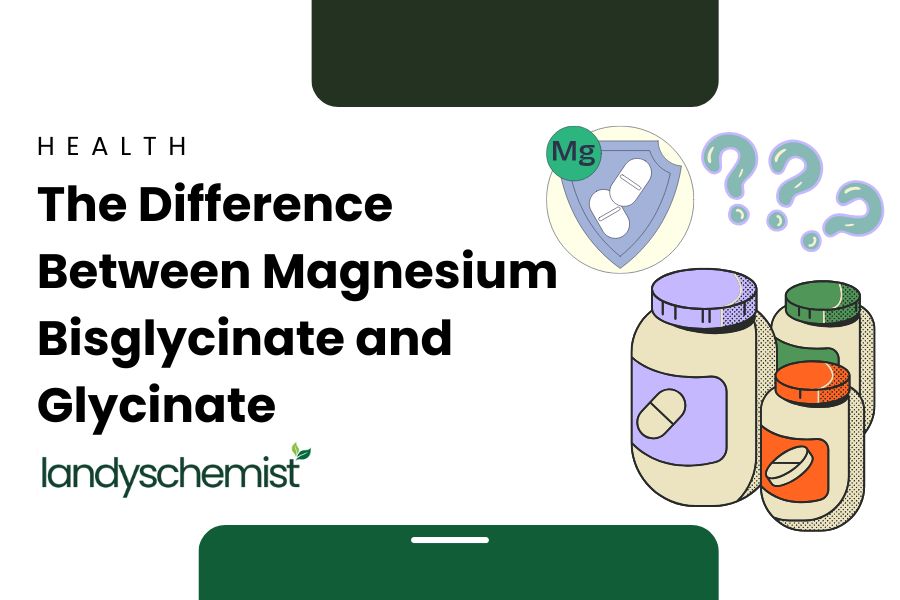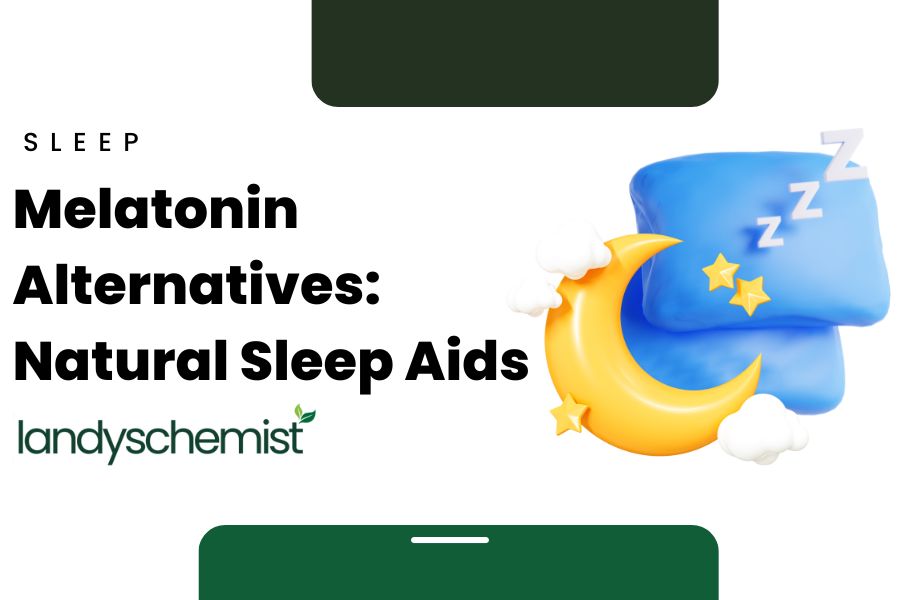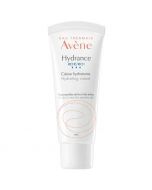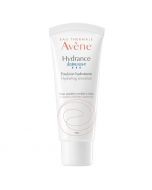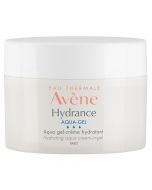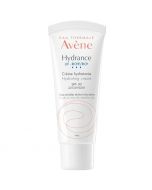
A skincare routine to manage dehydrated skin
There is often confusion about the difference between dehydrated and dry skin, whether they are the same thing and how to treat both conditions. It is important to know that there is a clear distinction between dry and dehydrated skin: dehydrated skin lacks water and is a skin condition that can affect any skin type whereas dry skin is a skin type that lacks natural oils and lipids.
In this blog, we explore symptoms of dehydrated skin, causes and how the Avène Hydrance Range helps to provide long-lasting hydration to all dehydrated and sensitive skin types.
What does having dehydrated skin mean?
Having dehydrated skin means that your skin is losing water faster than it is absorbing it. The skin does not have enough water content which can cause symptoms like tightness, dullness, sensitivity and more. The skin of adults comprises of 70% water, highlighting its importance!
It is important to adjust your skincare routine to include more hydrating products, drinking plenty of water and avoid harsh skincare and environmental stressors to help improve skin hydration.
Is there a difference between dry and dehydrated skin?
There is a clear difference between dry and dehydrated skin, although both conditions can sometimes overlap and coexist with each other.
Dry skin is a skin type that is characterised by a lack of natural oils and lipids in the skin. The lack of lipids in the skin’s natural barrier means that it is unable to hold moisture in and keep impurities out, leading to a lack of hydration.
Dry skin can be genetic and result in symptoms like flakiness, rough texture, itchiness and can make the skin more prone to developing fine lines and wrinkles.
Dehydrated skin is a skin condition that can affect you whether you have oily, dry, sensitive, or normal skin. This is due to a lack of water in the skin, particularly in the stratum corneum (the top layer of the skin).
Dehydration is often temporary and can result from various factors like the environment, harsh skincare, and lifestyle changes which disrupt the skin’s natural barrier function. It can also cause skin to appear dull and sensitive but does not necessarily mean that the skin lacks oil production.
How to tell if your skin is dehydrated:
There are several signs that could indicate that your skin is dehydrated. These can include:
- Tightness: Dehydrated skin can often appear tight, particularly after cleansing.
- Dullness: A lack of hydration can lead to the skin lacking radiance and glow.
- Rough Texture: Dehydrated skin can cause the skin to appear rough with possible flakiness.
- Fine Lines and Wrinkles: Dehydrated skin can often emphasise the appearance of fine lines and wrinkles, making them more noticeable, especially around the eyes, nose, and mouth.
- Sensitive: Dehydrated skin can become more prone to irritation and redness.
- Oiliness: Dehydrated skin can trigger an overproduction of oil as the skin tries to overcompensate for the lack of moisture.
- Lack of elasticity: Dehydrated skin may appear less firm and elastic which can further emphasise the formation of fine lines and wrinkles.
- Itching and Irritation: Dehydrated skin can feel dry and irritated and become more prone to itchiness.
Factors that can lead to dehydrated skin:
There are several factors that can contribute to dehydrated skin:
Environmental conditions and Excessive Sun Exposure:
Harsh weather including wind, cold temperatures, indoor heaters and low humidity can strip the skin of its natural oils and lead to a lack of moisture, dryness, and dehydration.
Environmental pollutants as well as excessive sun exposure can also damage the skin’s natural barrier function and cause oxidative stress which can increase water loss and dehydration of the skin. This can impair the skin’s ability to retain moisture in the skin as well.
Harsh Skincare Products can dry out the skin:
Harsh skincare ingredients including those that contain alcohol can also strip the skin of its natural oils and damage the skin’s moisture barrier. This can lead to more water loss and a feeling of tightness on the skin.
Not drinking enough Water can dehydrate the skin
Not drinking enough water can cause dehydrated skin as low hydration levels can affect the skin’s ability to retain moisture. This can compromise the skin barrier function and increase water loss and susceptibility to external irritants.
Dehydrated skin can become more sensitive to irritation, inflammation, and premature ageing, and so it is important to maintain proper hydration of the stratum corneum to preserve and support the skin’s natural functions.
Over Washing and dehydrated skin:
Over washing the skin can strip it of its natural oils, which can disrupt the moisture balance and skin barrier function. This can increase water loss contributing to dehydrated skin.
It is important to note that using harsh cleansers and hot water can further exacerbate this effect leaving skin that feels dry, tight, and prone to dehydration.
Stress and dehydrated skin:
When we are stressed, the hormone cortisol is released which can impair the skin’s natural barrier function and affect the skin’s ability to retain water. This can lead to dull, tight, and dehydrated skin.
The Best Skincare to treat dehydrated skin:
When looking for skincare to manage dehydrated skin, it is important to identify key ingredients and products that will help to restore comfort to the skin like Hyaluronic Acid and Thermal Spring Water. Skincare plays a crucial role in strengthening the skin barrier which can help to reduce water loss and protect the skin from oxidative stress which can further aggravate dryness.
The Avène Hydrance Range
The Avène Hydrance Range has been formulated by experts to provide long-lasting hydration for all dehydrated and sensitive skin types. With clinically proven effectiveness, these products help the skin in 3 ways: hydrate, soothe and purify.
This Range combines two key ingredients: Cohederm™ with Avène Thermal Spring Water to provide 24 hours of continuous hydration and comfort to the skin.
The Hydrance range also provides moisturisers with two textures to allow you to find a skincare product that is optimal for your skin type. For skin that is dry to very dry, the Avène Hydrance Rich Hydrating Cream provides a luxurious and creaky texture to nourish sensitive skin without leaving a greasy feel. On the other hand, the Avène Hydrance Light Hydrating Emulsion provides lightweight comfort and hydration, ideal for those with normal to combination skin types.
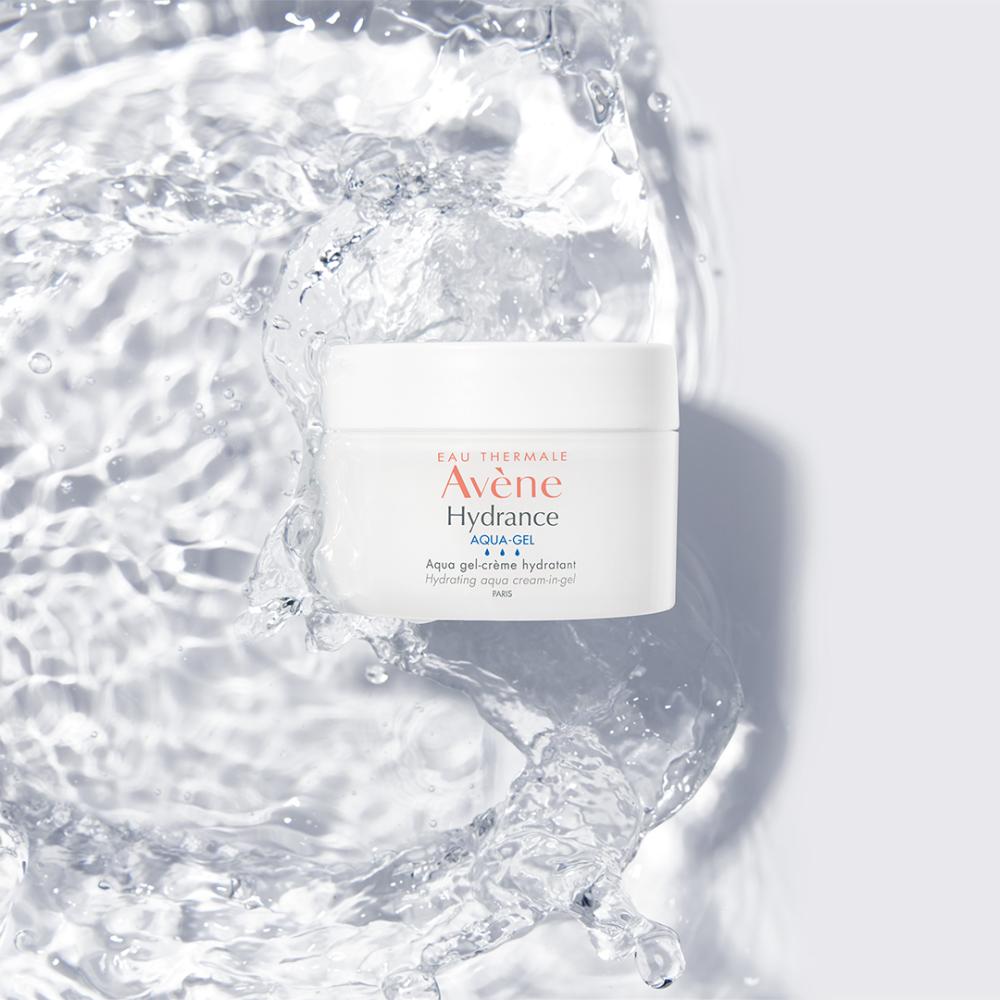
How does the Avène Hydrance range help to manage dehydrated skin?
One of the core ingredients of the Avène Hydrance range is Cohederm™. This is a patented hydrating complex of a trio of lipids that contain reservoirs of water that the skin can draw from, helping to restore hydration levels within the skin and prevent water loss.
Another ingredient that is key to the Avène Hydrance Range is Avène Thermal Spring Water. The Avène Thermal Spring Water is 100% pure, low in minerals and is pH neutral making it optimal for the balance and tolerance of our skin. Rich in trace elements like Zinc and balanced in Calcium and Magnesium, this water helps to soften, soothe, and restore the skin barrier of all sensitive, intolerant, and allergic skin types with its anti-irritating properties.
A simple routine for dehydrated skin
Soothe the skin with Avène Thermal Spring Water
Using the Avène Thermal Spring Water Spray after cleansing can provide multiple benefits for the skin.
This refreshing spray helps to soothe and calm the skin, effectively neutralising the potential harsh effects of hard water while enhancing the benefits of subsequent moisturising products.
Suitable for all types of sensitive skin, this spray helps to offer daily relief from external aggressors that can irritate the skin barrier every day.
With its soothing, anti-irritant and soothing properties, this spray effectively alleviates skin discomfort and promotes skin balance, ultimately helping to reduce sensitivity over time.
Simply spray directly onto the face to provide immediate and long-lasting relief.
Hydrate the skin with the Avène Hydrance Boost Concentrated Hydrating Serum
The Avène Hydrance Boost Concentrated Hydrating Serum combines High-weight Hyaluronic Acid with Niacinamide (Vitamin B3) and Avène Thermal Spring Water to provide 48 hours of hydration, replenish the skin with water and strengthen the skin barrier.
This ultra-light gel water texture contains 96% natural origin ingredients and helps the skin to regain comfort and suppleness whilst respecting the delicate balance of the skin.
This serum can be applied in the morning and/or evening to the face and neck. Smooth gently into the face using an outwards motion, from the middle of the face outwards.
Moisturise with the Avène Hydrance UV Light Hydrating Emulsion SPF30
Moisturising is crucial to maintaining skin hydration.
The Avène Hydrance UV Light Hydrating Emulsion SPF30 is a gentle and light fluid perfect for those that have combination, dehydrated and sensitive skin. It helps to minimise the appearance of dehydration lines and enhance the luminosity of the skin.
This emulsion is light and non-sticky, formulated with Cohederm™ and Sunsitive® protection to provide long-lasting 24-hour hydration as well as high SPF30 protection. Sunsitive protection is a patented filter system comprising of 4 solar filters for very broad UVA and UVB protection. It is also enriched with ProVitamin E and Avène Thermal Spring Water to soothe and protect the skin from oxidative stress.
This hydrating emulsion can be used daily, just spread a small amount onto your fingertips and dab it onto the face and neck until fully absorbed.
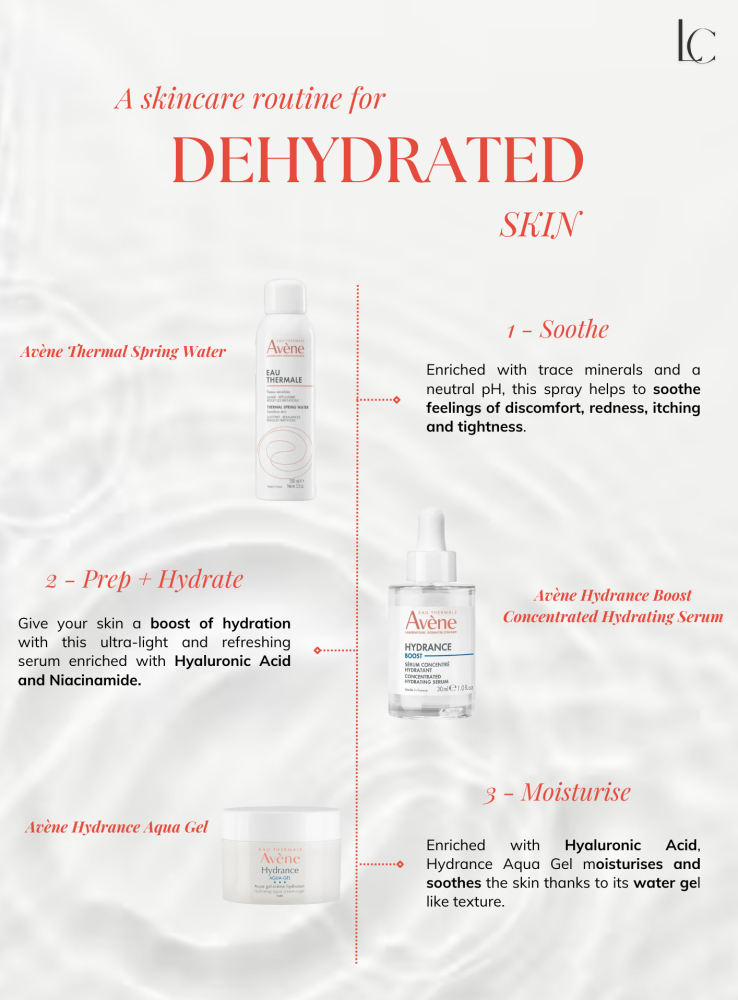
By Saarah Mengrani, MSc Biotechnology

